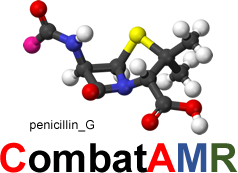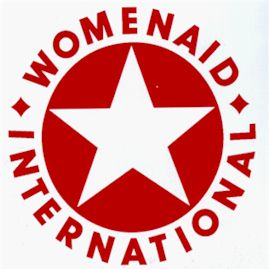MAJOR HUMANITARIAN PARTNERSHIPS
The 7th British NGO to be invited into an official partnership with the European Community Humanitarian Organisation (ECHO), WomenAid provided over 30,000 MT of food, medical and other supplies, valued at more than £12 million, to more than 1.5 million refugees, IDPs and other vulnerable people in Former Yugoslavia, the Caucasus, Central Asia, Albania and Kosovo.
In the early 1990’s as the founder and voluntary director of WomenAid International Pida Ripley secured over 10,000 MT of food aid from the Ministry of Agriculture, Food and Fisheries, (MAFF) and established implementing and development partnerships with UN agencies (UNHCR, WFP, UNICEF & WHO).
Still working in a voluntary capacity, she developed and implemented major humanitarian aid programmes directed to refugees and internally displaced persons (IDPs) throughout the Former Yugoslavia, Armenia, Georgia and Kyrgyzstan – in some cases in very dangerous circumstances. These programmes were mainly funded by ECHO, UN agencies, DFID and WomenAid.
“Once again, I would like to thank you and WomenAid on behalf of WHO for your kind donation to former Yugoslavia. WomenAid is to be commended for its valuable work and its further endeavours encouraged.” We are very grateful for your assistance to WHO and hope you will keep us in mind for future donations.”
Dr G.B. Forte, WHO Medical Supplies Officer, WHO Regional Office for Europe
1994 & 1995 WomenAid/UN WFP Supplementary Feeding Programme
8200 MT throughout the Former Yugoslavia.
Pida successfully secured a massive donation of more than 8,200 tonnes of food aid from the UK Ministry of Agriculture & Fisheries (MAFF). This donation she provided to the UN World Food Programme (WFP) former Yugoslavia operations, obtaining a further £750,000 to faciliatate full logistics and delivery by WomenAid to end distribution points throughout Yugoslavia.
Distributed: Bosnia-Herzegovina, Croatia, Macedonia, Montenegro, Serbia, Slovenia, UNPAs
Partners: ECHO, ODA, MAFF, UN WFP, WHO, UNHCR, USAF, WAI & multiple Government Ministries.
8,200MT HPB’s £6,250,000 + £811,564 logistics (ODA). Programme value: £7,061,564
“We face an enormous challenge, which we cannot tackle alone. Only with voluntary contributions from governments and dedicated organizations such as WOMENAID, can refugees look forward to a better future. Refugees are the responsibility of all of us. Working together, we can help millions of refugees pick up the pieces of their lives.”
USAF Operation Provide Promise - WomenAid Logistics Partnership
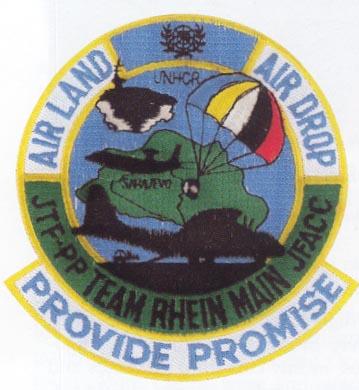
The United States set up Operation Provide Promise and, in cooperation with UNHCR and the World Food Programme (WFP), began airdropping relief supplies to parts of Bosnia -Herzegovina on 28 February 1993. By late November, more than 1,482 airdrop flights had been flown by the participating nations, delivering over 10,100 tons of food and 167 tons of medical supplies to places like Srebrenica, Zepa, Cerska, Konjevic, Goradze, Tuzla, Mostar, Maglaj, and Tesanj.
United States, French and German cargo aircraft taxi for takeoff at Rhein-Main Air Base in Germany for an Operation Provide Promise airdrop mission over central Bosnia -Herzegovina
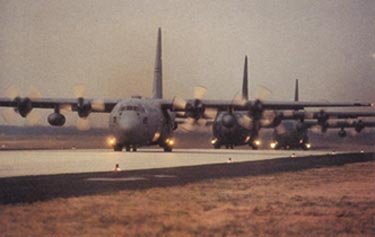
WomenAid International became one of the main partners of Operation Provide Promise, supplying high protein biscuits (HPB’s) donated to WomenAid by the UK Ministry of Agriculture, Food, and Fisheries. The Overseas Development Administration funded WomenAid to undertake the transportation and logistics for distribution of over 10,000 tons of HPB’s across the Yugoslav war zone. WomenAid delivered approximately 3000 tons to the Rhein-Mann Air Base, Germany for the central Bosnia airdrop and to the Ancona Air Base, Italy for the Sarajevo airlift.
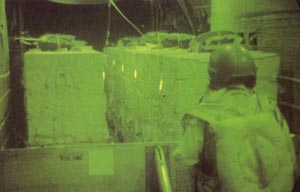
Once over the drop zone, it took only a few seconds to roll the bundles out the back of the C-130’s cargo bay. 26 foot parachutes were attached to the tops of the bundles of food and medical supplies.
The purpose of the parachutes was not so much to slow the fall of the bundles – they hit the ground at 60 mph – but to stabilize them for accuracy.
C-130 drops aid over Tesanj. The aid bundles sit on thick layers of corrugated cardboard to protect the contents on impact.
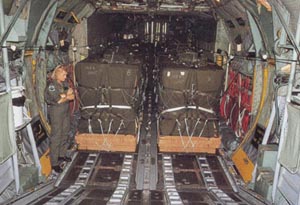
On a typical night airdrop missions were flown by six U.S. C-130 Hercules and by one French and one German Transall. Each mission took about six hours.
The Former Yugoslavia regional coordinator for the United Nations World Food Programme, wrote to WomenAid International to say this support 'undoubtedly saved lives.'
In early 1993 WomenAid International had also participated in another U.S. airlift, ‘Operation Provide Hope’, delivering aid supplies to the Republic of Georgia in the south Caucasus. Shortly afterwards WomenAid was requested to assist in Georgia and began working there - staying in-country until 2005.
WomenAid Begins Working in the Caucasus
The collapse of communism and the rise of ethnic strife plunged the southern fringes of the former Soviet Union into turmoil, particularly in the Caucasus where some 1.5 million people had been forced from their homes in Georgia, Armenia and Azerbaijan. Although there was sporadic media coverage of the fighting, the world was largely unaware of the human suffering that followed for hundreds of thousands of refugees and internally displaced people in all three republics. Read more on Conflict in the Caucasus.
His Excellency Armen Sarkissian, Ambassador for Armenia met Pida Ripley when she was a director at Chatham House in the early 1990s and urged her to expand the WomenAid International humanitarian programme activities to include Armenia. Armenia was at war with Azerbaijan. In response, WomenAid International began work in Armenia and expanded in the Caucusus region delivery multi-million aid programmes for several years.
1994-1996 School Feeding Programmes
1994-1995 School Feeding Programme, Armenia
Partners: ECHO, ODA, MAFF, UN WFP, IFRC, WAI, Armenian Ministry Education £1,902,562
Beneficiaries: 589,076 Supplies: 1040 MT + 615 MT. Programme value: 510,000 Ecu + £675,000+ £780,000
“We greatly appreciate your contribution to the implementation of this honourable program (school feeding programme) in such severe conditions. It should be noted, that thanks to the liquid milk, delivered at the gymnasium, dozens of school-children’s lives were rescued, who got an asphyxiation from carbon monoxide, while heating our classrooms. The medical personnel, invited to the gymnasium, emphasised that if children hadn’t drunk milk, their lives would be in danger. One more time we express our gratitude.
Akhurian District Centre Gymnasium, RA Ministry of Education, Director Papikian

1995-1996 School Feeding Programme Armenia
Partners: ECHO, ODA, UN WFP, WAI, FAR, Armenian Ministry Education. Ministry Health, Humanitarian Dept.
Beneficiaries: 325,000 Supplies: 600 MT. Programme value: 510,000 Ecu + £450,000
1994-96 Emergency Assistance for Hospital Patients, Armenia
1994-95 Emergency Feeding Programme 90 Days Hospital Patients, Armenia
Partner: ECHO, WAI, Armenian Ministry Health.
Beneficiaries: 13,500. Supplies: 421 MT. Programme value 380,000 Ecu
1995-1996 Hygienic Supplies to Medical Institutions, Armenia
Partner: ECHO, WAI, Armenian Ministry Health
Beneficiaries: 13,500 95,825 items. Programme value: 150,000 Ecu
1995 Schools & Hospitals Urgent Repair Programme, Armenia/UN WFP ‘Food for Work’
Partner: ECHO, UN WFP, WAI, Armenian Ministries of Health, Education, Refugees & Humanitarian.
Beneficiaries: 22 hospitals, 30 schools. 60MT food. Programme value: 500,000 + Ecu


"The Republic of Armenia, Ministry of Health, expresses its gratitude to WomenAid International for carrying out the Hospitals Repair Programme during these difficult times in Armenia. I know this programme is the only one of its kind in Armenia on such a scale being implemented by humanitarian organisations. I should like to remark the short time scale of the programme within which the workers managed to do the repair construction works at a highly professional level."
Deputy Minister Health, G Shmavonian.

1995: UN WFP Emergency Food Assistance for 240,000+
Refugees/IDPs & Vulnerable People, Armenia
Partner: UN WFP, WAI, multiple Armenian Ministries .
Distributing partner-559 Distribution Points. Beneficiaries: 241,639. Supplies: 6966.2 MT foods,
"Our collaboration with WomenAid International as a major implementing partner, was commendable achieving our common goals to serve 240,000 refugees, IDPs and vulnerable persons throughout the Republic of Armenia…
We remain appreciative of the assistance of WomenAid International as an implementing partner. May I take this opportunity to congratulate you on founding an esteemed organization."
Mamo Desta, UN World Food Programme Country Director, Armenia
1995: 210 Day Emergency Food Programme, Mestia, Georgia
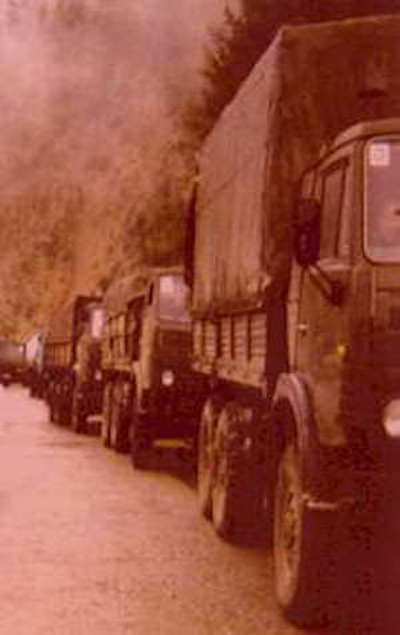
Upon her return to active service in Georgia, the Georgian govermnent requested WomenAid International deliver emergency food supplies to refugees and IDPs in Svaneti, a remote and extremely dangerous uncontrolled mountainous region.
A joint WAI/UNWFP convoy personally led by Pida Ripley came under fire at Etseri, a village in Svaneti. Bandits stole her lead jeep and distribution documentation. Pida had just returned from a 4 month hospital recovery from multi-serious trauma in London following an attempted kidnap which caused her jeep to fly off-road while trying to escape. Incandescant with anger at this new attack, she blockaded the bandit village and, despite a tense standoff, she recovered the jeep and documentation, enabling the convoy to continue its planned deliveries. The Georgian Minstry of Interior sent a special forces team to the region, a notorious area not controlled by the Georgian government. Further attacks took place on the following delivery convoys.
Partner: UN WFP, WAI, Georgian Ministry Refugees & IDPs, Imereti & Svaneti Regional Authorities.
Beneficiaries: 28,434. UN WFP funded Distributing Partner
1995: 210 Day Emergency Food Programme, Kodori Valley, Abkhazia
Working once again in partnership with the UN World Food Programme, vulnerable people, living in the highest villages in Europe, in the remote mountains of Svaneti and Kodori Valley, Apkhazeti, received emergency food aid delivered by WomenAid International. Once again a WomenAid convoy came under attack and WomenAid monitors and staff were held hostage for some time in along with some UN peacekeepers.
Partners: UN WFP, WAI, Georgian Ministry Refugees & IDPs. UN WFP funded Distributing Partner

Refugees from Abkhazia had to travel in bitter winter weather over the 2,780 metres high Chuberi Pass
1995/6 Supplementary Feeding, Pre-school children, Georgia.
Partner: ECHO, WFP, ODA, MAFF, Georgian Ministry Education, Ministry Refugees & IDP, & Humanitarian Office.
Beneficiaries: 128,500. Programme value: 240,000 Ecu + £180,000
The conditions in Georgia in the '90s were very bleak and dangerous. In fact Georgia was included in the top 5 most dangerous countries in the world. The country was trying to recover from a bloody civil war - with opposition parties preventing a final conclusion. Most Georgian men were carrying weapons. There was no electricity, no gas, no heating, extremely limited communication, no personal security possible. Gangs were circulating robbing other citizens. Aid agencies were clearly a target. Winter in the Caucasus delivers very low minus temperatures; people struggled on. Sending their children to freezing schools where at least they would receive a little food and some hot milk. Most citizens received no pay for months on end including the police. These were the times of "never to be forgotten hardship" in the region.
“I would like to express my appreciation of your concern and deep involvement
in designing a supplementary feeding programme for the pre-school institutions
in Kutaisi and the whole Imereti region….we deeply appreciate your help.”
Teimuraz Shashiashvili, Mayor of Kutaisi & Governor of the Imereti Region. 21.11.1995

Supplementary Feeding Programmes, Kyrgyzstan.
1995 Supplementary Feeding Programme –Pregnant & Lactating Women, Kyrgyzstan.
Partner: ECHO, WAI. Kyrgyz Government Ministry Health, Ministry Humanitarian Assistance
Beneficiaries: 165,000. Programme value: 1,000,000 Ecu
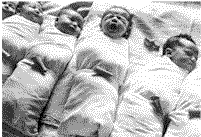
“I wish more reports could be this well-structured and as concise and with this level of pertinent detail.
WomenAid International monitored usage of products distributed correctly and both prevented and corrected the abuse which is rife in other actions of members of staff of institutions syphoning off humanitarian aid in lieu of pay. This action shows that some NGOs in the field are capable and responsible.”
A.Van der Veen, Desk Officer, European Community Humanitarian Office (ECHO). 11.10.1995
"We would like to thank you for your invaluable contribution to the women of the Republic of Kyrgyzstan at the time of hardships."
Chief Doctor, G Sharshekunova, parents and staff, Children's Polyclinic, No.4, Bishkek.

Natalya Ulanova
1996 Supplementary Food & Logistic Support Pregnant Women and Newborn, Kyrgyzstan.
Partner: ECHO, WAI, Kyrgyz Ministry Health, Ministry Humanitarian Aid. Beneficiaries: 130,000 most vulnerable countrywide.
Programme value: 600,000 Ecu
"I am very thankful and glad that we have such an organisation as WomenAid International. I will never forget your help. I wish health to all of you.
1997: ITN NEWS AT TEN SPECIAL REPORT:
Emergency assistance to Psychiatric hospital in Yaroslavl, Russia.
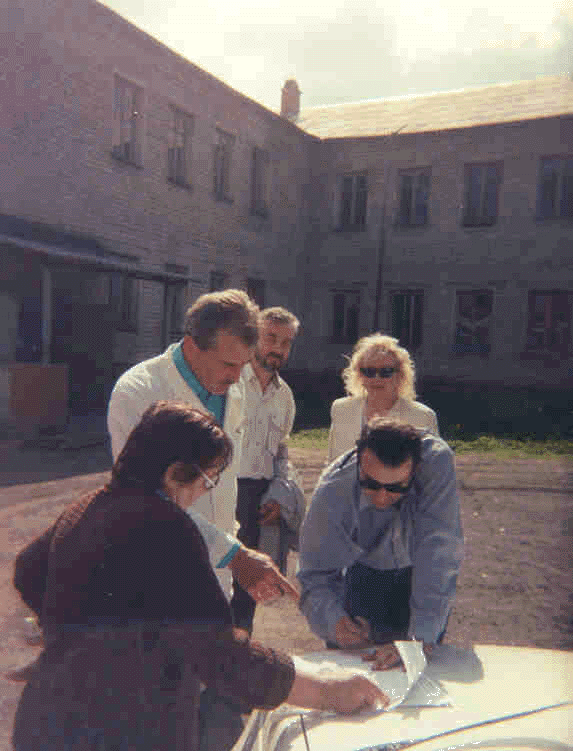
ITN transmitted a 'News at Ten' Special Report in May 1997 on dying patients in the Yaraslavl Regional Psychiatric Hospital in the village of Afonino, Russia. The hospital management had not received any money for many months and the patients were starving. The only food the patients had received had been supplied by the caring staff, who received their own small salaries intermittently. Consequently, the patients were struggling to survive on potato and water soup, sometimes with a piece of bread. Twenty three patients died and many more lost so much body fat they were suffering infections.
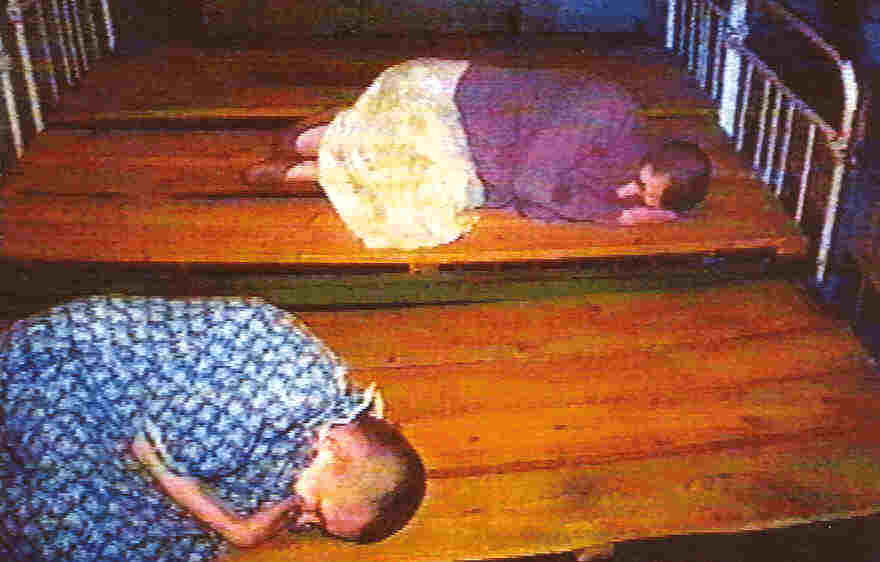
Pida Ripley and a staff member travelled with the News at Ten reporters to deliver urgent food supplies and hygienic products. The conditions the patients endured were catastrophic. Many of the eighty female patients were naked and slept on bare boards as the beds had no mattresses.
The one hundred and sixty male patients were dressed in ragged clothes and most had no shoes and unsurprisingly complained of being cold. Following meetings with the Ministry of Health in Moscow funds were made available to the institution. During a meeting at the Ministry of Health in Moscow, a Deputy Minister of Health regretted having to admit such conditions were replicated throughout Russia.
1998-99: Albania & Kosovo Crisis
WomenAid was one of the very few aid organisations established in Albania before the mass exodus of refugees from Kosovo occurred and consequently was an early provider of humanitarian aid and assistance to thousands of refugees through its Tirana based office.
Partners: UK businesses, Church groups, media appeals and private donors.
“Thank you Pida, that you’re helping my country. ‘A friend in need is a friend in deed. I didn’t know that we have to live this 1999 year. Living at the edge of this century and we couldn’t imagine to have such a bloody spring and we are trying to survive because we are mothers and for the sake of life we all must do everything we can to survive.”
Meri Lalaj, Albanian writer ‘Kapercyell’. 11.04.1999
2000 Onwards
Following completion of a successful ECHO audit of all its programmes and with firm offers of further funding available, WomenAid changed its strategy, deciding to remain in the Caucasus to focus on empowering women’s organisations, civil society development and inter-regional stabilisation processes.
“I would like to take this opportunity to congratulate you on the overall positive audit conclusion and also for the good work completed by WomenAid with ECHO in the past.”
C Adinolfi, Director, European Community Humanitarian Office (ECHO) 02.06.2000
Highly successful five-year joint multimedia campaigns promoting greater awareness of human rights, health, ending all forms of gender violence and environmental activities were developed in partnership with press and media, UN agencies, government ministries and international and national non-governmental organisations in Georgia, Armenia and Azerbaijan.
WomenAid was successful in acting as a catalyst and
securing changes in government policies and national legislation.
